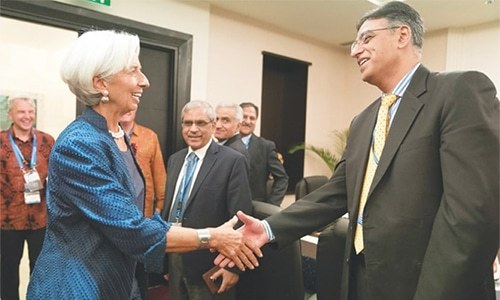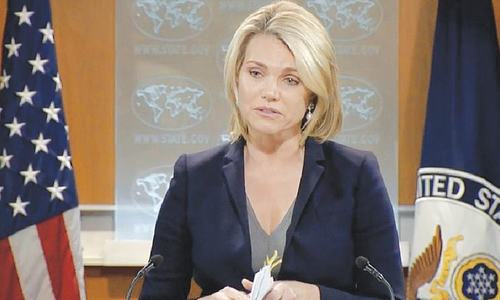THAT racket of objects smashing is the sound of the PTI bull in the proverbial china shop.
I know Imran Khan has asked the media for a three-month honeymoon, but financial markets don’t grant any respite. So when the rupee went into free fall against the dollar, and the stock market lost 1,300 points in a single day, what did our prime minister say to reassure investors?
He reverted to the only script he knows, railing against corruption, promising to bring back money taken abroad illegally, and assuring us that overseas Pakistanis would plug the $10 billion gap in our foreign exchange account. But while this kind of populist rhetoric goes down well with Khan’s supporters, it did little to calm the markets, with many traders expressing bafflement over his bizarre messaging.
As our economy explores new lows, who’s in charge?
After the panic comes the pain. With the rupee plunging to new lows, we can safely expect a sharp price rise. As all imports will now cost more, the effects of devaluation will ripple through the economy, causing an inflationary spike that will most affect the poor. The price of petroleum and gas will shoot up, raising prices in every sector, with electricity charges spiralling out of control. Did I hear somebody say Khan and our chief justice have a cunning plan to build dams to overcome our energy shortfall?
And as our economy explores new lows, who’s in charge? The PTI has typically blamed the PML-N for the mess it has inherited. But it’s a bit late for playing the blame game: Imran Khan is now PM, and the buck stops with him. And he has made Asad Umar the finance minister, for better or for worse.
Never having met him, I thought he came across as a reasonable, fairly competent person with some relevant corporate experience behind him. How wrong I was. Somebody has sent me Engro’s annual accounts for the five years Asad Umar served there as CEO, and I’m afraid they make for dismal reading. What puzzles me is why one of Pakistan’s biggest conglomerates waited five years before parting ways with him.
For starters, Engro shares fell by 77 per cent during Umar’s tenure, largely because of the ill-conceived new fertiliser plant he had pushed. After he left, the annual report for 2012 said, “the very survival of the company was at stake”. In fact, Engro lost Rs3bn in its fertiliser operation in just a year. Its other subsidiaries didn’t fare much better.
When Pakistani farmers buy all the fertiliser produced in the country, it is difficult to see why Engro’s flagship plant did not thrive. The problem since its inception was that due to the depletion of many of our gas fields, the government was simply unable to supply the plant with the raw material it was based on. While the billion-dollar project was operational, it could not produce any fertiliser.
So how did a corporate titan — a title awarded by some pliant reporters — get it so badly wrong? According to my source, he and some top Engro executives did their best to persuade key officials and politicians in the last two governments to resolve the problem, but to no avail. They were told there was simply not enough gas.
A friend recently rang from Islamabad to say that he had just been to the Finance Ministry, and had never seen so much chaos and confusion. The embarrassment surrounding Imran Khan’s failed begging mission to Saudi Arabia should serve to remind him that while he might have a host of admirers in Pakistan, his charisma and cricketing reputation doesn’t cut much ice abroad.
And so to the IMF. Here, Asad Umar and his team will be negotiating with tough international bureaucrats with plenty of banking experience who can smell the sour odour of desperation. Had a request been made as soon as this government was sworn in, there would have been a timely resolution of our finances that would have averted the financial crisis we are presently engulfed in today.
However, Khan was trapped by his own ignorant rhetoric: for years, he has been castigating other politicians for being ‘slaves of the IMF’, so he found it hard to go to the institution that will impose tough conditions for any loan it approves. But surely national interest should come ahead of personal ego, but in Khan’s case, ego is pretty much all we get.
One would have expected that among Khan’s crowd of fawning loyalists, there would have been a few with a finance background and some solid business experience. But when I look at their credentials and their background, I realise how flimsy they are.
The truth is that shouting threats and abuses at rallies doesn’t really prepare you for the difficult task of governing and delivering. And while Khan might have been convinced of his team’s abilities, it has taken less than a couple of months for them to be exposed.
Published in Dawn, October 13th, 2018
















































